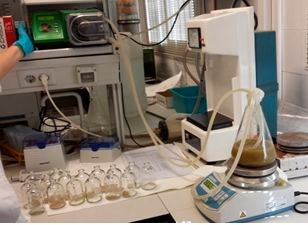Feb 18 2019
Based on an earlier treatment of proteins on their diet, researchers from UPM have successfully decreased the ammonia and methane emissions produced during the process of digestion in ruminants.
 In vitro system used for the experimental works. (Image credit: UPM)
In vitro system used for the experimental works. (Image credit: UPM)
Adjusting the diet of ruminants enables reducing the environmental pollution produced by their digestion. Researchers from Universidad Politécnica de Madrid (UPM) have arrived at this conclusion based on a study in which they tested that earlier treatment of proteins on their diet helps in decreasing the rumen degradation up to 10% of the methane emissions generated in the ruminal fermentation.
Even though these results were obtained with the help of in vitro tests and need confirmation in vivo, the results actually make room for remarkable opportunities related to the development of new approaches of animal nutrition that add to the planet’s sustainability.
There has been a constant development in animal nutrition in order to increase the food quality and food efficiency of animal origin. This is a necessity, as it will help fulfill the growing demands of the human population.
The case of ruminants is considered to be important as they generate a large quantity of methane all through their entire digestive process. Besides existing as a potent greenhouse gas, methane is also known to represent a major energy loss to the animal. Furthermore, ruminants possess a low efficiency of nitrogen use and hence they expel a huge proportion of the nitrogen ingested into the environment.
Latest studies from the Production Animal Group at the School of Agricultural, Food and Biosystems Engineering (ETSIAAB-UPM) have illustrated that the methane gas produced by ruminants is also generated by the fermentation of proteins. Perhaps, this is because of the fermentation of carbon chains ensuing from amino acid deamination produced in the protein degradation.
With the aim to lower the emissions produced by these animals and considering these study results, UPM researchers have gone ahead and analyzed the outcome of the digestion of ruminants when reducing the contents of degradable protein in their diets, but constantly guaranteeing a minimum level that does not negatively affect the growth of microbial population.
In this very manner, researchers treated the proteins of the diet to incite their denaturation and help safeguard such proteins from the degradation of the rumen.
To select the most appropriate food product to which this treatment can be applied, UPM researchers searched for protein concentrates containing higher quantities of degradable proteins and vital amino acids. The sunflower seed and meal possess such properties because they are extremely degradable and rich in tryptophan and sulfur amino acids.
The method established by the researchers focuses on applying an acid-heat treatment to the protein food product.
The malic acid obtained the best results, and in addition, it can be used as an additive to improve the efficiency of food use.
Dolores Carro, Researcher, UPM
Researchers performed in vitro digestive process simulations and they also developed a high-protein diet (17%) and a moderate-protein diet (13%) produced from sunflower seed and meal. Additionally, they also evaluated the emissions following the ingestion of both treated food and untreated food with heat and malic acid.
The results showed that the treated food reduced the protein degradability of sunflower meal and loss of nitrogen as ammonia gas. Besides, methane production was reduced by 4.6% in the case of low-protein diets and by 10.8% in high-protein diets.
Dolores Carro, Researcher, UPM
These results will have to be proved through in vivo studies, but the researchers are a step ahead with regards to the development of approaches of animal nutrition that are considered to be more respectful with the environment.